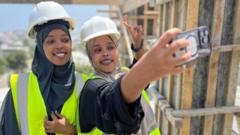The construction boom in Somalia's capital city, Mogadishu, has not only transformed its physical landscape but has also opened doors for women like Fathi Mohamed Abdi and Saadia Ahmed Omar. Both in their early 20s, these female engineers are overseeing a 10-floor apartment complex in the Hodan District, defying stereotypes in a field predominantly occupied by men.
"When I began my career, many questioned my capabilities," recalls Abdi, the chief operating officer of Arkan Engineering Services. "They asked how I could be trusted to manage a construction project as a young woman." Over the past five years, Abdi and Omar have gained recognition for their contributions to over 30 significant construction projects.
"Mogadishu needs us," states Omar, reflecting on her childhood memories of a war-torn city and her commitment to its renewal. Born during the civil war, both women have chosen to remain in Somalia, driven by their passion for rebuilding their homeland amidst ongoing conflicts and challenges posed by groups like al-Shabab.
Ibrahim Abdi Heyle, chairman of the Somali Engineers Association, acknowledges the dynamic shift in the engineering sector due to high demand for professionals. “The landscape is changing, and we are encouraging women's involvement not just as a necessity but because they bring diverse perspectives vital for our progress,” he comments.
Recent figures indicate that over 6,000 buildings have sprung up in Mogadishu in the last five years, a testament to the improved security and economic conditions. However, with rapid development comes the risk of compromising building quality and historical integrity. Veteran architect Siidow Cabdulle Boolaay voices concerns about losing the city’s historical character to modern constructions lacking safety standards.
Despite the challenges, the passage of regulations three years ago is seen as a step towards enhanced quality control in construction. However, analysts warn about the long-term sustainability of such rapid urban development. Environmental adviser Christophe Hodder emphasizes the need for coordinated water management and infrastructure planning to prevent crises amidst the city's ongoing transformation.
As the construction landscape continues to evolve, both Abdi and Omar embody a new era of resilience and empowerment for women in Somalia. "We are building not just structures but also the possibility of a brighter future," Abdi asserts, while Omar adds, "Every building I see reminds me that we can achieve more than what was thought possible."
Mogadishu's journey of reconstruction reflects both its past and its aspirations, showcasing the hopeful narrative of a city rising from the ashes, led by the voices of its women.




















